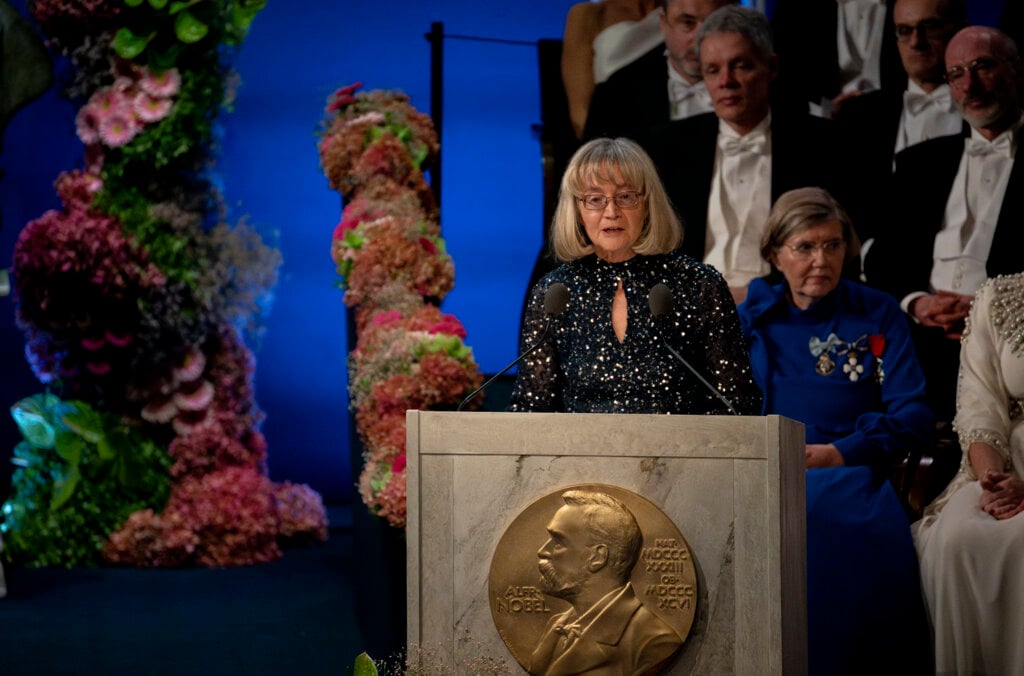Award ceremony speech

English
Swedish
Presentation speech by Author Ellen Mattson, Member of the Swedish Academy, Member of the Nobel Committee for Literature, 10 December 2024.
Your Majesties, Esteemed Nobel Laureates, Ladies and Gentlemen,
Two colours meet in Han Kang’s writing: white and red. The white is the snow that falls in so many of her books, drawing a protective curtain between the narrator and the world, but white is also the colour of sorrow, and of death. Red stands for life, but also for pain, blood, the deep cuts of a knife. While her voice can be seductively soft, it speaks of indescribable cruelty, of irreparable loss. Blood flows from the bodies piled up after the massacre, darkens, becomes an appeal, a question that the text can neither answer nor ignore: how should we relate to the dead, the abducted, the disappeared? What can we do for them? What do we owe them? The white and the red symbolize a historical experience that Han returns to in her novels.
In We Do Not Part from 2021, the snow creates a space where a meeting can take place between the living and the dead, and those floating in between who are yet to decide which category they belong to. The entire novel is played out within a snowstorm where, in piecing together her memories, the narrative self glides through layers of time, interacting with the shadows of the dead and learning from their knowledge – because ultimately it is always about knowledge and seeking out the truth, unbearable though it may be. In one exquisitely realized evocation, the friend, despite her physical body being confined to a hospital bed many miles away, is able to pull out a box of files from a shelf and find a document that adds a further piece to the historical mosaic. The dream spills over into reality, the past into the present. These shifts, by which boundaries are dissolved, are a constant in Han’s writing, where people move around unhindered, their feelers pointing in both directions, ready to gather and interpret signals. Perhaps they are broken down by what they see and witness, which always comes at the price of their own peace of mind. And yet they keep on going with the strength that is required. Forgetting is never the goal.
‘Who killed me?’ asks the murdered boy’s soul, as the facial features that defined him in life dissolve and disappear. For the survivor, the question is a different one: how can I live on with this body that has only led me to torment? How can I regain the body that torture has reduced to nothing but a bleeding object? But when the body gives up, the soul continues to speak.
When the soul tires, the body keeps on walking. Deep within lies a stubborn resistance, a quiet insistence stronger than words, a need to remember: again, it is not the aim to forget, nor would it be possible. In Han’s world, people are wounded, fragile, in some sense weak, and yet they possess just enough strength, and just the right kind of strength, to take another step or ask another question, request another document or interview another surviving witness. As the light fades, the shadows of the dead continue to move around on the wall. Nothing ever passes; nothing ever ends.
Dear Han Kang, on behalf of the Swedish Academy, it is my privilege to convey to you our warmest congratulations on the Nobel Prize in Literature 2024. May I now please ask you to step forward and receive your prize from His Majesty the King.
Copyright © The Nobel Foundation 2024
Nobel Prizes and laureates
Six prizes were awarded for achievements that have conferred the greatest benefit to humankind. The 12 laureates' work and discoveries range from proteins' structures and machine learning to fighting for a world free of nuclear weapons.
See them all presented here.
